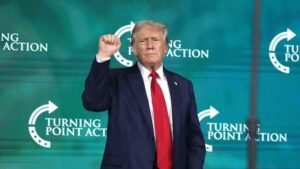
Image Source: Getty Images |Photo by Michael M. Santiago
In a chilling analysis, former President Donald Trump has been identified as a significant threat to American civil liberties, potentially heralding an era of racial violence and political tyranny if he were to reclaim the White House in 2025. New York Times columnist Thomas Edsall delivered this stark warning in a piece published on Wednesday, urging voters to be wary of what one expert described as a “deal with the devil.”
Edsall asserts that the everyday lives of Americans could be fundamentally jeopardized by a Trump presidency. “It is the ordinary, day-to-day life we lead at our kitchen tables and in our bedrooms that is most dangerously threatened by the tyranny that a return of Trump to power would represent,” he writes. He emphasizes that this is the type of tyranny that “everyone who reads these words should fear most and work hardest to hold at bay.”
The foundation of Edsall’s analysis draws upon Trump’s own spoken and written words, as well as interviews with political scientists and alarming data concerning the sentiments of his MAGA supporters. He warns that Trump has already begun to dismantle political safeguards that could prevent him from executing threats, which include deploying the military against perceived adversaries, aligning with authoritarian leaders he admires, and undermining the civil service. Such actions could also lead to diminished American influence abroad, particularly with European allies.
Edsall highlights findings from a recent University of California-Davis study indicating that a troubling third of MAGA Republicans anticipate an imminent civil war. Moreover, more than half of those surveyed deem political violence justified, and nearly three-quarters believe white people are facing discrimination and replacement. The study concludes that “concern about the potential for political violence among MAGA Republicans appears to be justified,” based on assessments from experts in violent domestic extremism.

Yale professor of constitutional law Jack Balkin also weighed in, cautioning that Trump and his conservative allies have dealt critical blows to essential protections against presidential misconduct. Balkin notes that Trump would likely appoint advisers who will not challenge him. “Two failed attempts at impeachment and removal during Trump’s first term have demonstrated that impeachment is not a viable remedy,” he stated.
The potential for accountability is further threatened, according to Balkin, as Trump can “launder everything through discussions with his close subordinates, especially members of the Justice Department, and claim absolute immunity.” This complicates the prospects for holding a president accountable for misconduct.
Edsall criticizes what he views as a dangerously narrow perspective among Trump’s critics regarding the implications of his political threats. He warns, “Never forget that law can oppress as easily as it can liberate and that it is the content and spirit of our laws and the character of those we entrust with enacting and enforcing them that makes fidelity to law so central to our experiment in self-government.”
His conclusion is stark and unsettling: “It’s both frightening and disturbing to think that two weeks from now American voters could once again make someone as unhinged and unbridled as Donald Trump the president of the United States.”
As the political landscape evolves, Edsall’s analysis serves as a timely reminder of the potential consequences of Trump’s return to power, urging voters to critically assess the implications of their choices in the upcoming election.


